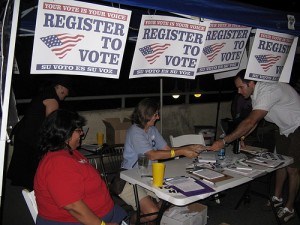Invoking history in voter registration law
14 October 2014 – Will Walker

2008 voter registration drive in Texas. Photo credit: Barack Obama’s photostream on Flickr
Last Thursday, the US Supreme Court and a federal district court issued separate rulings striking down voter ID laws in Wisconsin and Texas. The Texas ruling should be of particular interest to public historians because of the extent to which history is at the center of US District Court Judge Nelva Gonzalez Ramos’s decision.
Ramos ruled that the state’s voter ID law, which the Texas legislature passed and Governor Rick Perry signed in 2011, created “an unconstitutional burden on the right to vote” and had an “impermissible discriminatory effect against Hispanics and African-Americans.” Furthermore, she determined that the legislature had passed the law with “an unconstitutional discriminatory purpose” and that it created an “unconstitutional poll tax” (p. 2). The law required voters to show one of five government-issued forms of identification at polling places in order to be able to cast a vote.
The full decision, which is almost 150 pages long, contains extensive discussions of the history of racial discrimination and voter disenfranchisement in Texas. In clear prose that is mostly free of legal jargon, Ramos explicitly connects past injustices with present inequalities of both race and class. Detailing the Texas legislature’s “long history of discriminatory voting practices,” she demonstrates that the voter ID law is similar to previous efforts to disenfranchise African Americans and Hispanics in Texas starting in the late nineteenth century (p. 128).
Relying primarily on the expert testimony of Clemson University historian O. Vernon Burton, Ramos discusses the history of all-white primaries, literacy tests, and poll taxes. She also examines Texas politicians’ more recent efforts to require voters to re-register annually, disenfranchise African American students at Prairie View A&M, and draw voting district lines in racially discriminatory ways.
She does not, however, confine her analysis to laws and other governmental actions pertaining directly to voting rights. Instead, Ramos surveys “racial disparities in education, employment, housing, and transportation” in both the past and present (p. 8). Including this information is vital because she contends that it is the combination of racial discrimination and poverty that makes Texas’s voter ID law so burdensome and, ultimately, unconstitutional. To support this argument, she marshals evidence from an interdisciplinary group of scholars, including several political scientists, as well as a sociologist, an anthropologist, and a professor of urban planning. Remarkably, Ramos seamlessly blends historical, social scientific, and legal arguments to craft a convincing, albeit quite damning, decision.
It remains to be seen if the ruling will hold up upon appeal. Nevertheless, public historians can draw inspiration from the way Judge Ramos has incorporated a historical perspective into her landmark decision–one which future historians will undoubtedly study when they write the history of voter suppression in the early twenty-first century.
~ Will Walker is assistant professor of history at the Cooperstown Graduate Program (SUNY Oneonta) and a lead editor for History@Work. He is the author of A Living Exhibition: The Smithsonian and the Transformation of the Universal Museum.



